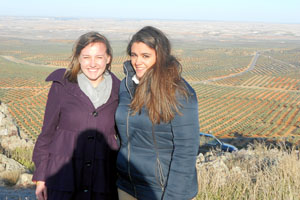Spending 19 days exploring a foreign country with friends and one of the greatest teachers in JC history sounds like a vacation, right? Wrong.
During a vacation, the ability to choose is always there. The Spanish exchange is not a vacation, because when on the exchange, all personal freedom is kaput.
Travelers on vacation can wander around and explore whichever paths they choose. However, in an unfamiliar country, exchange students must follow their host around like a lost puppy. There is no way to discover anything independently without the fear of getting lost down the winding streets.
Even at the host students’ houses, exchange students don’t get to decide when to leave for school, where to go for coffee, or even when to go to bed.
However, being a part of the exchange means being immersed in the culture. While living in a foreign household, students must eat all of the food that they’re offered, even a dish of chickpeas, a slab of potato, tomato paste, and hunk of mystery meat mushed into one bowl. Most importantly, students have to speak and understand a foreign language.
Being hit in the head with culture shock is the hardest part of an exchange program. Most, if not all, comforts of home are gone, and they can’t be found for another three weeks. However, despite being pushed into a new culture head first, being forced to embrace a country’s different lifestyle educates anyone who is a part of the experience.
The food may be a little different than mom’s chicken, but eating rabbit in paella contributes to the authentic Spanish experience. As frustrating it is breaking down the communication barrier, students gain invaluable knowledge by learning a language at its origin instead of in a classroom thousands of miles away.
While an exchange is definitely not a vacation, the experience undoubtedly changes every participant for the better.
Maggie Cassidy is Print Chief for The Patriot and jcpatriot.com



